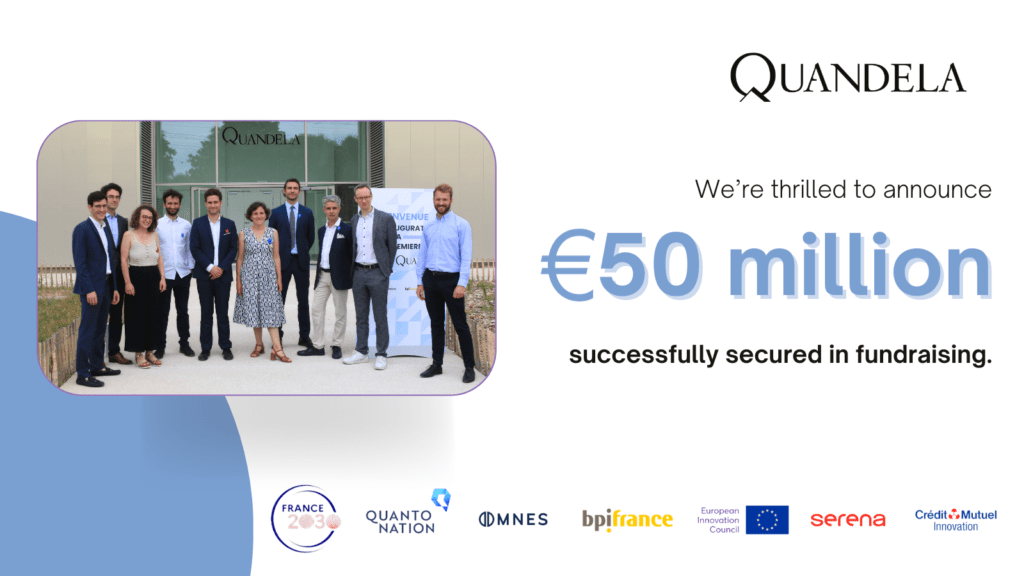Paris, November 7th 2023. Quandela, the European leader in photonic quantum
computing, has successfully secured over €50 million from investors, the
French government through the France 2030 Plan, and banking partners. New
investors, Serena, Credit Mutuel Innovation, and the European Innovation
Council Fund, have joined the company’s capital, alongside existing historical
investors, Bpifrance 1, OMNES Capital and Quantonation. Quandela has also
received support from France 2030 as the laureate of the “Première usine” call
for projects, operated by Bpifrance. This capital increase will allow Quandela to
expedite its international expansion and increase the production of its
quantum computers to meet the needs of industrial clients.
Over the past few months, Quandela has achieved several milestones, solidifying its
position as the leading European provider of photonic quantum computing. By the end
of 2022, Quandela became the first player in the European Union, and one of the few
globally, to make its quantum computers accessible via the cloud. Furthermore,
Quandela was the first European supplier to open its quantum computer manufacturing
facility in June 2023, in Massy (France). Today, the first quantum computer produced
in this facility has just been delivered to OVHcloud datacenter. This marks the first
European quantum computer purchased and hosted by an industrial client.
Quandela has already initiated the production of three new machines within its facility,
scheduled for deliveries in 2024. Simultaneously, the company, which already
collaborates with EDF, ONERA and MBDA, continues to develop use cases with
industrial players both in France and abroad.
While already established in Germany, Quandela now aims to solidify its position in
North American and Asian markets. To meet these new challenges, the company plans
to increase its workforce in the coming months.
This fundraising round represents a significant milestone for Quandela, enabling the
acceleration of its growth and support for its international expansion. Quandela will
thus strengthen its presence on the global stage with the objective of supporting an
increasing number of industrial clients in utilizing quantum computing to address ever
more complex use cases.”
“We’re very proud to continue to support the growth of Quandela, which successfully
opened Europe’s first quantum computer production plant a few months ago. This
support is a perfect illustration of the ambitions of Bpifrance’s Deeptech plan: to
encourage the rise of French champions driving breakthrough innovations in the
coming decades.” Paul-François Fournier, Executive Director in charge of
Innovation.
“Many years of R&D have enabled Quandela to converge fundamental and applied
research with the first industrial results, delivering a quantum computer in the cloud as
well as quantum computers for private customers. Over and above the quality of the
teams and the technological depth of their solution, these European – and in some
respects global – innovations have convinced us of the project’s potential and
scalability. The computing power of quantum has become real and accessible.
Structuring the teams and implementing the international roadmap will be among the
value-creating milestones ensuring the project’s success. Supporting projects at the
cutting edge of French know-how, with a strong economic impact and the capacity to
prepare for industrialization, is fully in line with Crédit Mutuel Innovation’s strategy.”
Maxence Valero, VC Investment Director, Crédit Mutuel Innovation.
“Quandela, as a major European player in photonic quantum computing, embodies the
innovation and disruptive potential actively supported by the EIC. This investment
reflects our trust in their capacity to bring about significant change and drive innovation
in the global technological landscape.” Svetoslava Georgieva, Chair of the EIC Fund
Board.
“At Serena, we’re convinced that quantum computing will revolutionize tomorrow’s
world. The choice of photonics, combined with a full-stack quantum architecture, is the
most promising approach we’ve seen to date. Quandela recently reached a new milestone by becoming the first player to have made qubits available in the cloud and to have sold the first machine to an industrial company. We are proud to support this world-renowned team in this phase of internationalization and industrialization.”
Floriane de Maupeou, Senior Associate, Serena.
About Quandela
Quandela, entreprise leader dans le domaine du calcul quantique, propose des solutions de niveau industriel. Quandela conçoit, construit et fournit des systèmes quantiques prêts à l’emploi pour les datacenters, des processeurs quantiques accessibles via le cloud, et des services d’accès aux algorithmes.
Fondée en 2017 par la professeure Pascale Senellart, directrice de recherche au Centre de nanosciences et nanotechnologies (C2N) du CNRS, Niccolo Somaschi et Valérian Giesz, experts de renommée internationale en physique quantique, Quandela emploie plus de 100 collaborateurs de 20 nationalités différentes, en majorité des chercheurs et des ingénieurs en optique, algorithmes et sciences de l’information.
Quandela s’engage à rendre l’informatique quantique accessible à tous pour relever les défis industriels et sociétaux les plus complexes.
Pour en savoir plus : www.quandela.com
GB
Quandela, a leader in quantum computing, specializes in industry-grade quantum computing solutions. Quandela designs, builds, and supplies datacenter-ready quantum computing systems, cloud-accessible quantum processors, and algorithm with industrial value.
Founded in 2017 by Professor Pascale Senellart, Research Director at the Centre for Nanosciences and Nanotechnologies (C2N) at CNRS, Niccolo Somaschi and Valerian Giesz, internationally renowned experts in quantum physics, Quandela currently has over 100 employees from 20 different nationalities, mostly researchers and engineers in optical, algorithm and data science.
Quandela is committed to making advanced quantum computing accessible and beneficial for all, empowering innovators to solve the most complex industrial and societal challenges.




